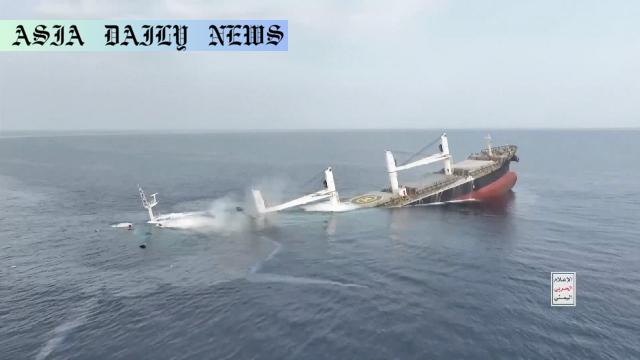Houthi attacks are disrupting maritime logistics by targeting vessels in the Red Sea, causing fatalities and raising shipping concerns.
Houthi rebels targeted two cargo ships in the Red Sea using explosives, causing massive disruptions to maritime logistics.
The attacks have led to a reported increase in insurance costs for shipping companies operating in the region.
The rebel group’s motives are linked to their solidarity with Hamas and explicit warnings against transporting goods tied to Israel.
Concerns are growing over the safety of crew members and the stability of Red Sea shipping routes due to these attacks.

Introduction: Houthi Attacks Threaten Maritime Stability
The recent escalation of Houthi rebel attacks in the Red Sea has sparked serious concerns among global maritime stakeholders. Over the past week, the group sunk two cargo ships using explosives, leading to both material destruction and human casualties. Videos shared by the Houthis showcased one ship’s sinking, reinforcing their explicit warning about barring shipments linked to Israel. This situation has raised questions about the safety and cost-effectiveness of maritime operations in one of the world’s most critical trade routes.
The Background of Houthi Operations in the Red Sea
Originating in Yemen, the Houthi rebel group has long been involved in regional conflicts. Their operations in the Red Sea, however, mark a significant escalation of their activities. This critical waterway sees a large volume of international trading vessels pass through daily, making it a vulnerable point of interest for disruption. Their attacks are often driven by solidarity with Islamic group Hamas and opposition to Israel, a point they have emphasized in both their statements and actions. What once appeared as isolated incidents has now evolved into targeted attacks on vessels, signaling a methodical strategy to destabilize critical trade routes.
Economic Repercussions on Maritime Logistics
The economic impact of these attacks cannot be overstated. According to sources cited by Reuters, insurance costs for transporting goods through the Red Sea have more than doubled within mere days. Shipping companies now face higher operational costs, while industries dependent on goods transported via this route are bracing for delays and price surges. Countries reliant on Red Sea shipping lanes for import/export activities may need to explore alternative routes, further complicating global supply chains. These disruptions have the potential not only to affect regional trade but also to ripple through international markets.
The Humanitarian Toll of Maritime Violence
Beyond economic implications, these incidents have had devastating human costs. Reports indicate that while some crew members from the sunken vessels were rescued, others perished in the attacks. Seafarers operating along these routes now face heightened risks, necessitating improved security measures aboard ships. However, ensuring the safety of crew members in such high-risk zones adds yet another layer of complexity to maritime operations. This intensifies the urgent need for international cooperation to address the root causes of this aggression and restore peace in the waters.
Geopolitical Ramifications and Future Outlook
These attacks underscore the geopolitical complexities of the region. Despite a ceasefire agreement with the United States earlier this year, the Houthis made it clear that Israeli-linked shipments are excluded from its terms. This stance has unfortunately contributed to escalating tensions and undermined efforts to stabilize the region. If these attacks persist, not only will the Red Sea become less navigable, but it could also lead to broader international conflicts. Nations and global organizations must prioritize addressing these acts of aggression to ensure the safety and security of global trade routes.
The question remains: how will the international community respond to these escalating threats? As stakeholders deliberate on the best course of action, one thing is clear—the stability of Red Sea logistics hangs in precarious balance. Resolving this issue will require collaboration, diplomacy, and robust measures to deter further maritime violence.



Commentary
The Escalation of Houthi Attacks in a Global Context
The recent Houthi attacks in the Red Sea are troubling, not just for their immediate consequences but for what they signify concerning broader geopolitical tensions. These acts stand as a stark reminder of how localized conflicts can have far-reaching repercussions on global trade and security. As the Houthis explicitly target vessels associated with Israel, their actions draw a direct link between ideological motives and disruptive strategies, creating complexities that demand international intervention.
The Ripple Effects on Global Trade and Security
The rise in insurance costs for shipping through the Red Sea is just the tip of the iceberg. With increased risks in the region, operators may be forced to reroute or suspend their voyages, causing significant delays in the delivery of goods. This disruption extends far beyond localized markets, as supply chains depend heavily on stable maritime logistics. Food, raw materials, and other essential goods traded through these routes could see price surges, hitting consumers in distant markets.
The Urgent Need for Collaborative Solutions
What can be done to address these growing concerns? It is imperative for global leaders to unite and formulate a strategic response. Diplomacy should play a significant role in encouraging the Houthis to cease such disruptive activities. However, parallel efforts are needed to enhance maritime security in vulnerable areas. Investments in technology, such as tracking systems and patrol fleets, could mitigate some risks while negotiations continue behind the scenes.
In conclusion, the Houthi attacks showcase a crucial intersection of geopolitical conflict and economic disruption. Addressing these challenges requires sustained global commitment, innovative solutions, and a collective drive to protect the sanctity of international trade routes.